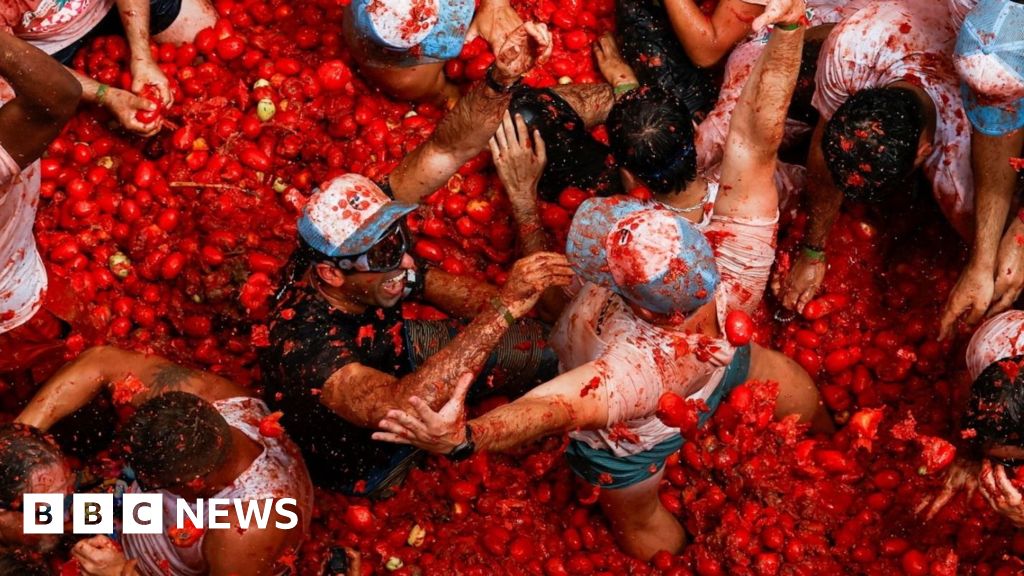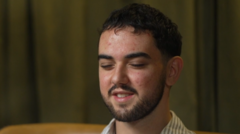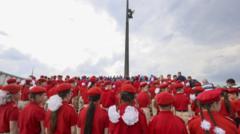Norwegian school-leavers, known as russ, have long participated in vibrant celebrations marked by wearing red overalls and partying in decorated buses. This year, the tradition has attracted increased scrutiny from parents and politicians due to concerns regarding the toll it takes on students' wellbeing and academic performance.
Selma Jenvin-Steinsvag, 18, and classmate Aksel hastily boarded the Oslo metro, expressing relief that their exams would soon be behind them. Traditionally celebrated leading up to Norway's national day on May 17, these festivities now commence weeks earlier, extending the party scene significantly. Edvard Aanestad, 19, described the russebuss—party buses driving all night filled with noise and revelry—as a rite of passage; however, the pressure to participate alongside peer expectations complicates the situation.
With high expenses associated with renting and outfitting these buses, many students opt for significant debt to participate in the festivities. Critics argue this leads to excessive drinking, drug use, and sleep deprivation, all while coinciding with exam periods, which raises alarms among parents and educators alike.
Prime Minister Jonas Gahr Støre noted that while he too cherished his graduation celebrations, the escalating party bus culture had reached critical levels of concern. As parents like Solveig Haukenes Aase voice worries about the negative impact this has on younger students, there is a growing consensus that action must be taken.
Norway's Minister of Education, Kari Nessa Nordtun, acknowledged the persistent intertwining of celebrations and exam stress, highlighting a decline in academic performance attributed to the distractions of partying. A movement is underway aiming to shift celebrations post-exams, aiming to combat issues of social exclusion and escalating costs.
The party bus tradition began in the early 1980s but has evolved to become increasingly commercialized. With some groups reportedly spending up to 3 million krone (£220,000), the financial burden adds pressures to young participants, sometimes leading to debt in order to fund the celebrations.
Safety concerns over the actions of students partying on buses have also garnered government attention. Norway's Minister of Transport, Jon-Ivar Nygard, announced plans to eliminate unsafe bus modifications that currently allow various seating arrangements during transport, a move some students resist, arguing it could limit participation even further.
Despite the rising calls for change, young adults like Edvard and his friend Henrik remain hopeful about balancing traditional celebrations with growing concerns. As dialogue continues surrounding the future of russefest, it remains to be seen how the government will respond to these evolving cultural practices among Norway’s youth.
Selma Jenvin-Steinsvag, 18, and classmate Aksel hastily boarded the Oslo metro, expressing relief that their exams would soon be behind them. Traditionally celebrated leading up to Norway's national day on May 17, these festivities now commence weeks earlier, extending the party scene significantly. Edvard Aanestad, 19, described the russebuss—party buses driving all night filled with noise and revelry—as a rite of passage; however, the pressure to participate alongside peer expectations complicates the situation.
With high expenses associated with renting and outfitting these buses, many students opt for significant debt to participate in the festivities. Critics argue this leads to excessive drinking, drug use, and sleep deprivation, all while coinciding with exam periods, which raises alarms among parents and educators alike.
Prime Minister Jonas Gahr Støre noted that while he too cherished his graduation celebrations, the escalating party bus culture had reached critical levels of concern. As parents like Solveig Haukenes Aase voice worries about the negative impact this has on younger students, there is a growing consensus that action must be taken.
Norway's Minister of Education, Kari Nessa Nordtun, acknowledged the persistent intertwining of celebrations and exam stress, highlighting a decline in academic performance attributed to the distractions of partying. A movement is underway aiming to shift celebrations post-exams, aiming to combat issues of social exclusion and escalating costs.
The party bus tradition began in the early 1980s but has evolved to become increasingly commercialized. With some groups reportedly spending up to 3 million krone (£220,000), the financial burden adds pressures to young participants, sometimes leading to debt in order to fund the celebrations.
Safety concerns over the actions of students partying on buses have also garnered government attention. Norway's Minister of Transport, Jon-Ivar Nygard, announced plans to eliminate unsafe bus modifications that currently allow various seating arrangements during transport, a move some students resist, arguing it could limit participation even further.
Despite the rising calls for change, young adults like Edvard and his friend Henrik remain hopeful about balancing traditional celebrations with growing concerns. As dialogue continues surrounding the future of russefest, it remains to be seen how the government will respond to these evolving cultural practices among Norway’s youth.



















